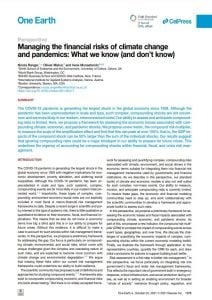

Managing the financial risks of climate change and pandemics: What we know (and don’t know)
PERSPECTIVE| VOLUME 4, ISSUE 10, P1375-1385, OCTOBER 22, 2021.
The COVID-19 pandemic is generating the largest shock ...
Author(s):
Summary:
PERSPECTIVE| VOLUME 4, ISSUE 10, P1375-1385, OCTOBER 22, 2021.
The COVID-19 pandemic is generating the largest shock in the global economy since 1929. Although the pandemic has been unprecedented in scale and type, such complex, compounding shocks are not uncommon and are more likely in our modern, interconnected world. Our ability to assess and anticipate compounding risks is limited. Here, authors propose a framework for assessing the economic losses associated with compounding climate, economic, and pandemic shocks.
They propose a new metric, the compound risk multiplier, to measure the scale of the amplification effect and find that this can peak at over 150%; that is, the GDP impacts of the compound shock can be 50% larger than the sum of the individual shocks.
Their results suggest that ignoring compounding risks could be a major blindspot in our ability to prepare for future crises. This underlines the urgency of accounting for compounding shocks within financial, fiscal, and crisis risk management.
Keywords:
climate change, economics, risk, government, financial institutions, COVID-19, systemic risk, pandemics, fiscal, financial risk, macroeconomic, compound risk, policy, risk management
Register to download PDF
Register/Log in| Type : | Academic Publication |
|---|---|
| Date : | 25/10/2021 |
| Keywords : |
PERSPECTIVE| VOLUME 4, ISSUE 10, P1375-1385, OCTOBER 22, 2021 |
| Editor : | On Earth |

